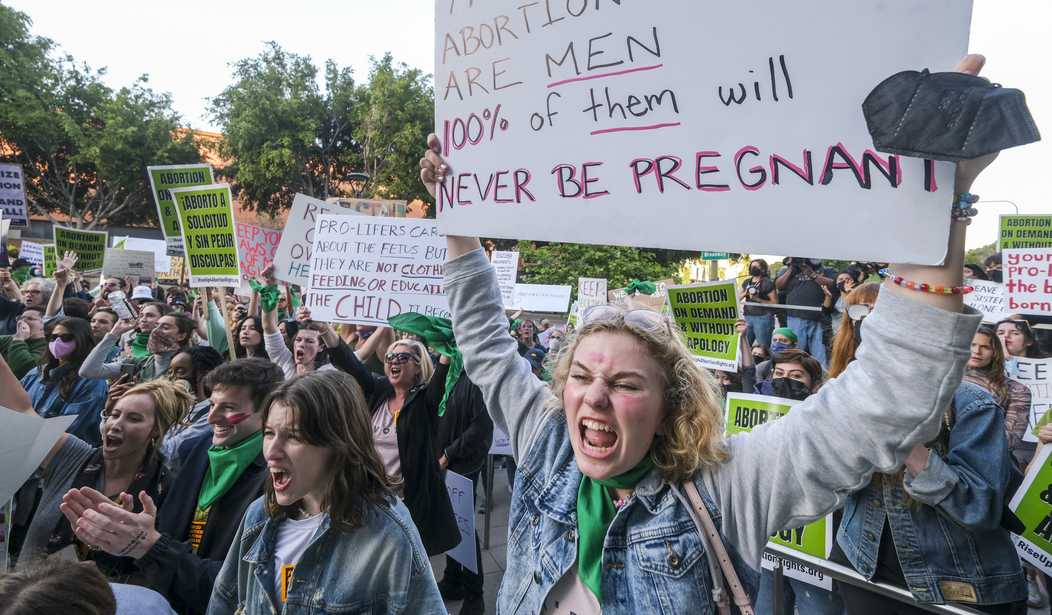A test of whether rank-and-file Dems are truly motivated to vote by the demise of Roe or just blowing smoke is coming sooner than you think. Amid the big primaries on Tuesday night in Arizona and Missouri, Kansas will hold a referendum on whether the right to abortion that’s currently protected by the state constitution should be left in place or stripped out. Kansas is a red state, of course, but it’s purple enough to have elected a Democrat governor in 2018. If Team Blue there turns out en masse and wins the referendum, politicians everywhere will treat it as a bellwether of national Democratic turnout this fall. Maybe there really *will* be a meaningful backlash to the Dobbs ruling in the midterms.
If instead Team Red wins the fight in Kansas, political pros will conclude that pro-choicers are a paper tiger. Sure, granted, most of the public opposes the Dobbs decision, but how many oppose it enough to get off their couches on Election Day to vote? Maybe fewer than Democrats would have us believe.
This new WaPo poll is circumstantial evidence for the “paper tiger” theory. If there were a ferocious backlash to Dobbs brewing, pro-choicers should be a little more amped to vote than they are, no?

The group with the smallest share that’s certain to vote is the one that believes the end of Roe is a major loss for women’s rights. Not looking good for Team Blue in Kansas on Tuesday. And we should bear that in mind when analyzing the apparent recent shift towards Democrats on the generic ballot. Most generic ballot polls are polls of registered voters, not likely voters. Dial someone up and ask them how they’d vote *if* they were to vote and the battle for Congress might be competitive. But factor in whether they *intend* to vote and it might not be.
Another problem for Democrats, as WaPo notes, is that some groups that oppose the end of Roe — adults under 30, lower-income people — tend to vote at lower rates historically. It’s one thing for the party to ask disaffected regular voters to lay aside their grievances with Biden and turn out as usual this fall for the sake of abortion rights. It’s another for them to convince people who don’t typically turn out that this is the moment to go get registered and cast their ballots. That’s a heavier lift.
On the other hand, national polls on this subject may be only so useful given the state-by-state dynamics of abortion. If you live in California and consider Dobbs a major loss for women’s rights, does it matter much whether you vote or not? Your state government, and probably your House district, will remain on your side whether you turn out or not. But if you live in Kansas, whether the state constitution continues to protect abortion rights or not is a momentous question considering that the state legislature is controlled by Republicans and will likely ban the practice if their side wins the upcoming referendum. It may be, in other words, that the soft national numbers for pro-choice enthusiasm in the WaPo poll are misleading. They may be soft nationally but strong in competitive districts, in which case the GOP has a problem.
There’s another complication for righties, namely that public opinion on Dobbs and abortion isn’t necessarily static. It may fluctuate depending upon how Republicans use their newfound authority to regulate the practice. Case in point:

That 81 percent includes 64 percent of Republicans, a warning to GOP legislatures that are looking for ways to deter travel by pregnant women out of state that if there isn’t a backlash to Dobbs yet, they might bring one about if they go too far.
Some Republican pols understand that. Punchbowl published a fascinating item last week about how many GOP women in Congress have already ruled out any sort of federal abortion ban in the future. Cynthia Lummis, Shelley Moore Capito, and Joni Ernst all pointed towards letting the states set abortion policy when asked, and Deb Fischer seemed inclined that way too. If they stick to that, even a big GOP Senate majority in 2025 won’t be able to pass a national ban. Per WaPo, insofar as the public has an appetite for abortion laws to be set by Congress, they want it pointing in the other direction: 58 percent say there should be a federal law permitting abortions before viability, which occurs at around 22-24 weeks.
Here’s one more data point from WaPo capturing a trend that has me scratching my head.

In years past, and as recently as this past April, Americans solidly preferred Democrats to Republicans in setting abortion policy. Yet despite their preference for pro-choice laws in WaPo’s poll, they’re now much less firmly decided: “Neither” has become the biggest vote-getter when people are offered a choice between handing abortion to D’s or R’s. I’m guessing that’s a pure “Dobbs effect,” with voters suddenly forced to grapple with the reality that radicals on both sides will be making the rules going forward instead of the Supreme Court. During the Roe era, the average person could treat a question like this as a simple litmus test on whether they’re pro-choice or pro-life generally, knowing that the Court would continue setting abortion policy instead of legislatures. Post-Dobbs, that’s no longer true. Now when you’re asked which party you want setting policy, you have to weigh the prospect of Democrats making abortion legal throughout pregnancy against Republicans wanting to ban the practice entirely. No wonder there’s a huge “neither” contingent.








Join the conversation as a VIP Member